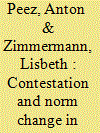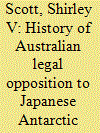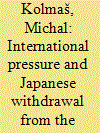|
|
|
Sort Order |
|
|
|
Items / Page
|
|
|
|
|
|
|
| Srl | Item |
| 1 |
ID:
185245


|
|
|
|
|
| Summary/Abstract |
Elephants and whales took center stage in the environmental movements of the 1980s. As flagship species, they were the poster children of global initiatives: international ivory trading and commercial whaling were banned in the 1980s in the context of the Convention on International Trade in Endangered Species of Wild Fauna and Flora (CITES) and the International Whaling Commission (IWC), respectively. While the conservation of both species is contested, we observe a change of existing norms in one case but not in the other: A moratorium on commercial whaling remains in place. Meanwhile, a limited shift to sustainable use regarding ivory was passed in 1997/2000. We ask why norm change occurred in one case but not the other, given their similarities. We argue that the difference can be explained by the perceived legitimacy of the claims of norm challengers using arguments of “affectedness” and the breadth of issues covered by CITES. In contrast, other factors commonly discussed in norms research do not explain this puzzle: the relative power and strategies of norm advocates and challengers, and the degree of legalization. This shows the interplay of discursive aspects and concrete institutional opportunities for norm change, even in the face of otherwise inopportune conditions.
|
|
|
|
|
|
|
|
|
|
|
|
|
|
|
|
| 2 |
ID:
138102


|
|
|
|
|
| Summary/Abstract |
Why did Japan begin scientific whaling, a policy that benefits few domestically and alienates many around the world? In this essay, I argue that Japan’s scientific whaling regime was formed as a result of a ‘two-level game’ between President Reagan and Prime Minister Nakasone. Although Reagan was faced with a unified, anti-whaling Congress, he himself was not much concerned about the issue. Nakasone was also not particularly concerned about whaling, and he initially was faced with a Diet that was divided on how to deal with whaling (although it became less divided over time). Ultimately, these circumstances led Japan to develop the scientific whaling regime that persists to this day.
|
|
|
|
|
|
|
|
|
|
|
|
|
|
|
|
| 3 |
ID:
168379


|
|
|
|
|
| Summary/Abstract |
Whaling has been a consistent theme in Australia’s relations with Japan since the 1930s, Australia having endeavoured to regulate, restrict, or bring to a complete halt Japan’s Antarctic whaling virtually since it began. Australia’s motivations have been mixed, involving at various points, some combination of protection of Australia’s coastal whaling industry, concern for Australia’s security, for safeguarding Australia’s Antarctic territorial claim, and more recently, concern for Australia’s whale-watching industry and/or for the whales. Since environmental consciousness became a primary factor in the 1970s, Australian policy has been aligned with that of anti-whaling non-governmental organizations (NGOs), albeit that certain actions of NGOs have caused difficulties for the Australian Government. Law – inclusive of legal argument in the course of diplomacy, domestic laws, and international litigation – has been a mechanism of influence used by the Australian Government and NGOs. This paper traces Australia’s legal opposition from its beginnings until Japan’s announcement in December 2018 that it would end Antarctic whaling.
|
|
|
|
|
|
|
|
|
|
|
|
|
|
|
|
| 4 |
ID:
184769


|
|
|
|
|
| Summary/Abstract |
Shaming in international relations has been extensively analysed as a normative practice that aims to persuade the target to comply with certain norms. Recently, IR scholars have identified cases, in which this process failed or antagonised the target. But although these studies have shown us how shaming works, they have not fully explained under what conditions shaming works. To remedy this, the article analyses the role of shaming in Japanese whaling controversy. In 2018, Japan announced its withdrawal from the International Whaling Commission, defying three decades of sustained international pressure. I identify two versions of shaming of Japanese whaling: premoratorium ‘soft' and post-moratorium ‘hard' shaming. The former, although less confrontational, had normative impact on Japanese society and policymaking, leading Tokyo to accept the moratorium and scale down on its whaling operations. The latter, marked by attacks of NGOs and heated discourse, had an opposite outcome and helped conservative policy entrepreneurs formulate a ‘cultural wars’ narrative that prevented the inception of anti-whaling norm. The reason for this difference, I argue, lies in Japanese domestic political culture, which played a defining role in the success/fail of shaming strategies. For shaming to be successful then, careful understanding of the target society is essential.
|
|
|
|
|
|
|
|
|
|
|
|
|
|
|
|
| 5 |
ID:
139597


|
|
|
|
|
| Summary/Abstract |
Marine species are known to use acoustic signals for biologically critical functions such as foraging, communication, navigation, etc. The unregulated maritime activities in the Indian Ocean Region (IOR) are translating into a rapid rise in the ambient noise and consequent acoustic degradation of the marine ecosystem. The environmental conservation initiatives are seen to be in direct conflict with the economic growth imperatives and are thus faced with significant political opposition. The lack of awareness regarding the acoustic aspect of the marine ecosystem towards generating credible underwater domain awareness is a major cause of concern and limits the effectiveness of any conservation efforts. Further, the IOR with its tropical littoral waters presents suboptimal performance of the underwater sensors deployed to generate underwater domain awareness. The authors attempt to provide an alternate perspective of the acoustic degradation of the marine ecosystem as a result of heightened maritime activities in the IOR. The complexities of formulating the regulatory framework and associated monitoring mechanism are also discussed.
|
|
|
|
|
|
|
|
|
|
|
|
|
|
|
|
|
|
|
|
|